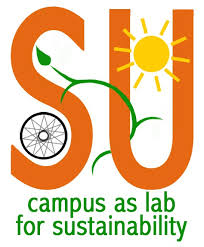
The SU Campus as a Laboratory for Sustainability (CALS) program is offering up to $75,000 for faculty or student projects that advance the University’s goals of reducing greenhouse gas emissions, directly or indirectly, or through raising awareness on campus about climate disruption and environmental sustainability.
Faculty and students from any discipline may apply. The next round of funding is available for projects undertaken between May 16, 2019, through June 30, 2020. Deadline for proposals is midnight on March 29, 2019. The Call for Proposals and application materials can be found at sustainability.syr.edu/cals/calsgrants/. Funds will become available May 15, 2019.
All proposals must clearly address how the project relates to climate disruption and must include outreach or educational activities that promote awareness of sustainability issues on the Syracuse University campus. Projects may include faculty or student research, applied research, campus infrastructure or landscape projects, outreach campaigns, service projects or course development.
The Syracuse University Climate Action Plan, released in 2009, is providing the competitive funding as part of the CALS program, overseen by a team of faculty and staff from across the University. The program merges academic scholarship with the University’s broad initiative to meet energy efficiency goals, while having SU faculty and students use the campus as a testbed for innovative ideas.
The last grant winners were announced in April 2018. Four projects were awarded funding:
- Don Carr, professor of design in the School of Design, is overseeing the creation of the course Sustainability Design Elective—SU Tiny House (DES 400/600).
- Jeongmin Ahn, associate professor of mechanical and aerospace engineering in the College of Engineering and Computer Science, is working to design a safer, more efficient, low-cost battery for electric vehicles.
- Caitlin Eger, a graduate student in the College of Engineering and Computer Science, is using emerging geophysical technologies and drones to map near-surface campus hydrology to determine locations on campus that would benefit from green stormwater infrastructure installations or retrofits.
- Philip Arnold, associate professor and chair of the Department of Religion in the College of Arts and Sciences, is developing a two-day workshop for faculty and advanced graduate students on the human and ecological history of Onondaga Lake, introducing indigenous ecological knowledge about sustainability and climate change for embedding the ideas into curriculum in a variety of disciplines.
Story by SU News Staff
Photo: Initial prototype unit developed by SU student startup SparkCharge, working with the Blackstone LaunchPad powered by Techstars at Syracuse University and the SyracuseCoE (Center of Excellence for Environmental and Energy Systems